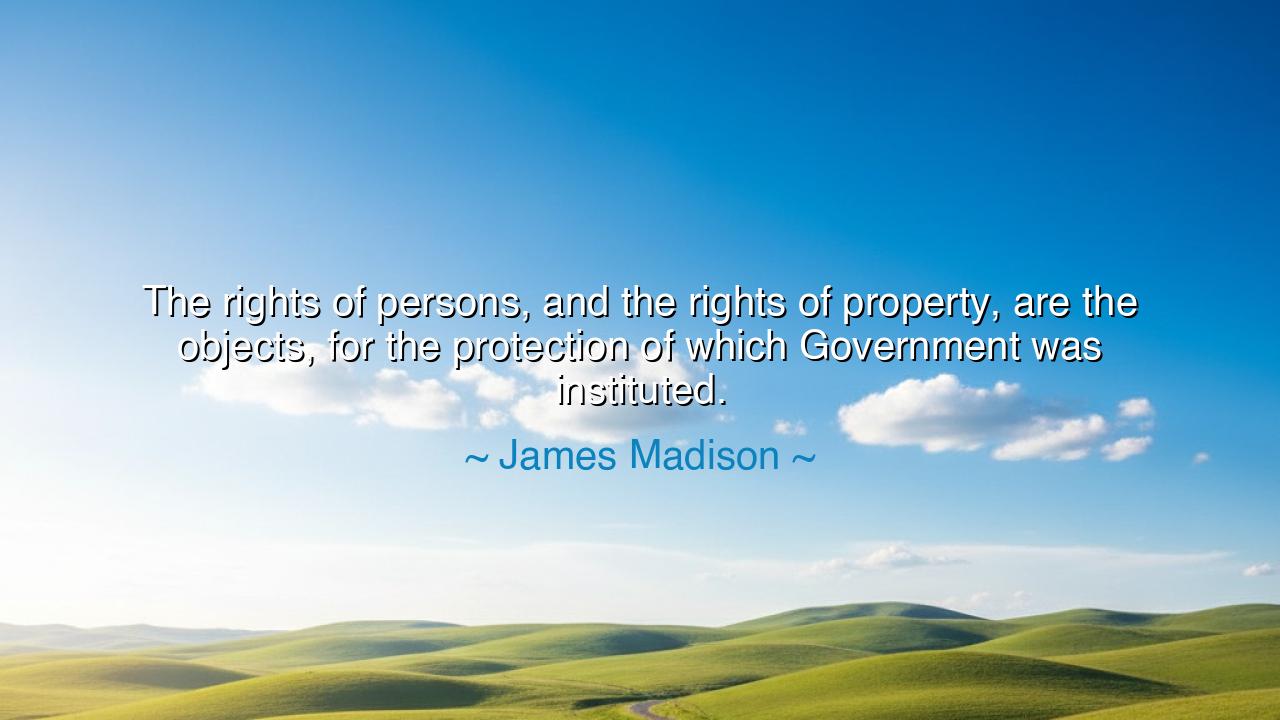
The rights of persons, and the rights of property, are the
The rights of persons, and the rights of property, are the objects, for the protection of which Government was instituted.






The words of James Madison, the Father of the American Constitution, resound like the measured voice of a philosopher-king: “The rights of persons, and the rights of property, are the objects, for the protection of which Government was instituted.” In these words lies the very soul of republican government, the foundation upon which liberty itself stands. Madison reminds us that the purpose of government is not to command, to enrich, or to glorify itself, but to protect—to safeguard the sacred realm of human dignity and the fruits of human labor. To forget this truth, he warns, is to turn the guardian into a master and the free citizen into a subject.
At its heart, this quote speaks of balance and justice, those twin pillars upon which all civilization rests. The rights of persons are the essence of freedom: the right to life, to conscience, to thought, and to action without oppression. The rights of property, meanwhile, are the material expression of those freedoms—the ability to possess, to create, to build, and to reap what one has sown. Madison understood that liberty cannot exist without both. For what value has freedom of speech if one’s home may be seized? And what meaning has wealth or property if one’s body and mind are bound by tyranny? Government, he declared, was created not to grant these rights—they are born of nature and of God—but to secure them, to stand as the wall between the citizen and the chaos of injustice.
The origin of these words reaches back to the early years of the American Republic, when Madison, alongside Washington, Jefferson, and Hamilton, sought to define the meaning of liberty in practical terms. Having witnessed the corruption of monarchies and the fragility of anarchy, he sought a middle path: a government of laws, not of men, strong enough to preserve order but restrained enough to prevent oppression. He believed that all authority should flow from one sacred purpose—the preservation of natural rights. Thus, when he helped craft the Constitution, he embedded in its design the separation of powers, the Bill of Rights, and the checks and balances that would keep government a servant rather than a master. To Madison, government was not an idol to be worshiped—it was a tool to be watched, guided, and held to account.
History, in its unending cycles, has proven Madison’s wisdom. When governments forget that their mission is protection, not control, they descend into tyranny. Consider the tragedy of Revolutionary France: born in the name of liberty, it soon devoured its own children. The rights of property were declared the enemy of the people, and the rights of persons were sacrificed to the guillotine. The government, meant to secure equality, became an engine of fear. In contrast, the American Republic, though imperfect and tested, endured—precisely because it was founded on Madison’s principle: that liberty and property, though distinct, are inseparable threads of the same tapestry. Where they are honored, peace and progress follow; where they are severed, nations fall into ruin.
Madison’s teaching also speaks beyond politics—it reaches into the realm of moral philosophy. The protection of rights, he implies, is not only the duty of rulers but of every citizen. For the laws of a free people are sustained not by force alone, but by virtue—by the collective will of individuals who respect the dignity and labor of others. The man who steals, the mob that loots, or the politician who confiscates under the guise of justice all commit the same sin: they destroy the trust upon which liberty depends. Thus, Madison’s vision demands of every person both responsibility and restraint—to claim one’s own rights boldly, but to defend the rights of others with equal zeal.
In the rhythm of his words, we hear the echo of an older truth—the wisdom of the ancients who taught that justice is harmony. Plato called it the balance of the soul; Aristotle, the order of the polis. Madison gave it new life in the language of a free republic. Government, he said, must neither favor the strong nor exploit the weak, but act as the impartial guardian of all. Only then can freedom endure across generations. When it strays from this sacred purpose—when it becomes a tool of ambition, ideology, or vengeance—it transforms from protector to predator, and the light of liberty dims.
The lesson, therefore, is timeless and urgent: remember why government exists. It is not to make us dependent, but to keep us free; not to distribute gifts, but to protect what we earn; not to bind the will of the people, but to ensure that the people may live without fear of injustice. Every citizen must hold their leaders—and themselves—to this measure. For the moment government forgets its purpose, it ceases to be government and becomes tyranny once more.
So let the wisdom of James Madison be carried like a sacred oath into every generation: that the protection of persons and property is the beginning and end of lawful power. Let every statesman remember it when tempted by ambition; let every citizen recall it when offered comfort at the cost of freedom. For a nation that forgets the meaning of its government will one day wake to find it ruling without mercy. But a people who hold fast to Madison’s vision will remain forever free—each person sovereign over his life, each home a fortress of dignity, and each generation a guardian of the flame of liberty.






AAdministratorAdministrator
Welcome, honored guests. Please leave a comment, we will respond soon